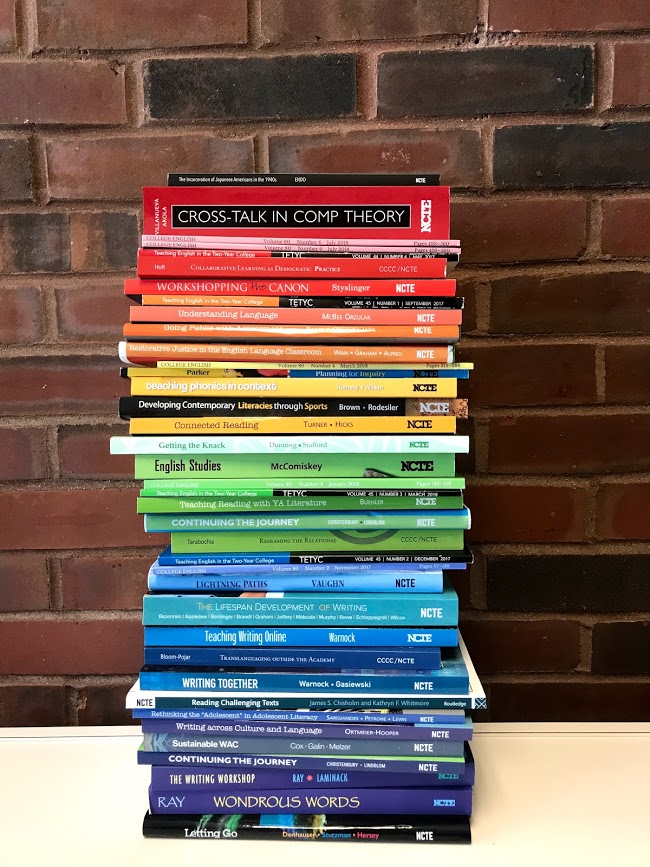The National Day on Writing® celebrates writing—and the many places, reasons, and ways we write each day—as an essential component of literacy. Since 2009, #WhyIWrite has encouraged thousands of people to lift their voices to the things that matter most to them. Check out the titles from NCTE to support you in the teaching of writing.
After Pedagogy: The Experience of Teaching argues that by turning what students and teachers know about writing into an area of intellectual inquiry, a philosophy of experience can make teaching sustainable after pedagogy.
Assembling Composition draws on historical studies as well as on current innovations of composing, and provides a new framework for understanding composing: assemblage theory.
Black Perspectives in Writing Program Administration: From the Margins to the Center makes a space for WPAs of color to cultivate antiracist responses within an Afrocentric framework and to enact socially responsible approaches to program building.
Beyond Progress in the Prison Classroom: Options and Opportunities argues that, when viewed as a microcosm of the broader enterprise, the prison classroom highlights the way that composition and rhetoric as a discipline continues to make use of colonial ways of knowing and of being that work against the decolonial intentions of the field.
Collaborative Learning as Democratic Practice: A History examines the rich historical and political contexts of collaborative learning, starting with John Dewey’s impact on progressive education in the early twentieth century.
Counterstory: The Rhetoric and Writing of Critical Race Theory makes a compelling case for counterstory as methodology in rhetoric and writing studies through the well-established framework of critical race theory (CRT).
Cross-Talk in Comp Theory: A Reader; 3rd Edition features eight new essays, including six in the new technology section, “Virtual Talk: Composing Beyond the Word.”
The Desire for Literacy: Writing in the Lives of Adult Learners shows how marginalized adult learners are able to theorize about their position in society, question dominant ideas, disrupt them, and challenge traditional literacy narratives in American culture.
Freedom Writing: African American Civil Rights Literacy Activism, 1955-1967 introduces gospel literacy, a theoretical framework analogous to gospel music within which to consider how the literacy activities of the Civil Rights Movement illuminate a continual interchange between secular and religious ideologies.
From Boys to Men: Rhetorics of Emergent American Masculinity explores performances of developing young male identity in case studies from twentieth- and twenty-first-century federal and civic organizations that recruit boys and young men using appeals to American national identity, often coding these appeals as character building.
Genre of Power: Police Report Writers and Readers in the Justice System describes the journey of a police report as it travels through the criminal justice system, exposing the ways in which power, agency, and authority circulate and accrue between writers and readers.
Immigrant Scholars in Rhetoric, Composition, and Communication: Memoirs of a First Generation shares the experiences of first-generation immigrant scholars in rhetoric, composition, and communication and how those experiences shape individual academic identity and, in turn, the teaching of writing and rhetoric.
Inside the Subject: A Theory of Identity for the Study of Writing develops a new theoretical approach to the study of writing by fusing key aspects of postmodern theory with the empirical sensibilities of composition studies and with that field’s long-standing investment in writerly agency.
On Multimodality: New Media in Composition Studies argues that composition’s embrace of new media and multimedia often makes those media serve the rhetorical ends of writing and composition, as opposed to exploring the rhetorical capabilities of those media.
Public Pedagogy in Composition Studies demonstrates how theories of public pedagogy can help composition specialists relocate teaching and learning within local public contexts beyond the classroom or campus.
Redesigning Composition for Multilingual Realities starts from the premise that “multilingualism is a daily reality for all students—all language users,” Jay Jordan proceeds to both complicate and enrich the responsibilities of the composition classroom as it attempts to accommodate and instruct a diversity of students in the practices of academic writing.
Reframing the Relational: A Pedagogical Ethic for Cross-Curricular Literacy Work argues that a pedagogical approach to faculty interactions in Writing Across the Curriculum (WAC) and Writing in the Disciplines (WID) contexts can enhance cross-disciplinary communication and collaboration and ultimately lead to more productive, sustainable initiatives.
Rhetorics Elsewhere and Otherwise: Contested Modernities, Decolonial Visions explores decolonial shifts in composition and rhetoric informed by strategies for potentially decolonizing language and literacy practices, writing and rhetorical instruction, and research practices and methods.
Rhetoric of Respect: Recognizing Change at a Community Writing Center examines a community writing center to show where change can happen and what is possible in academic–community writing partnerships when uncertainty, persistence, and respect converge.
Strategies for Teaching First-Year Composition offers guidance, reassurance, and thoughtful commentary on the many activities leading up to and surrounding classroom instruction
Toward a New Rhetoric of Difference provides a detailed analysis of diversity rhetoric and the ways institutions of higher education market diversity in and through student bodies.
Translanguaging outside the Academy: Negotiating Rhetoric and Healthcare in the Spanish Caribbean draws from an ethnographic study of a summer health program in the Dominican Republic to examine what exactly rhetorical translanguaging might look like, arguing for a rhetorical approach that accounts for stigma, race, and institutional constraints.
Writing Accomplices with Student Immigrant Rights Organizers argues for a pedagogical shift in centering the public writing classroom more on students’ work as organizers and rhetoricians.
Writing Programs, Veterans Studies, and the Post-9/11 University: A Field Guide offers rich academic inquiry into the idea of “the veteran” as well as into ways that veteran culture has been fostered or challenged in writing classrooms, in writing centers, and in college communities more generally.
Share with us your answer to #WhyIWrite!

